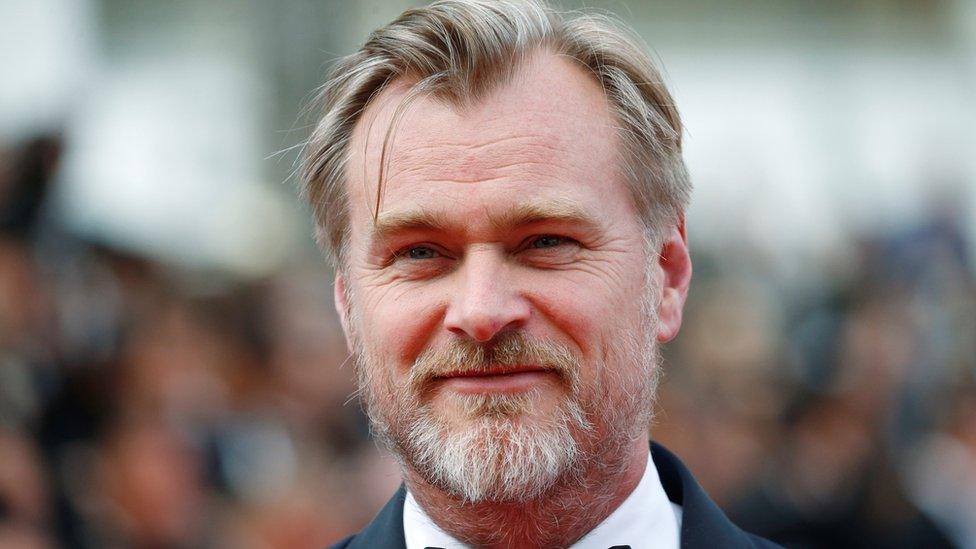Christopher Nolan: After Oppenheimer, no more films during strike action
- Published
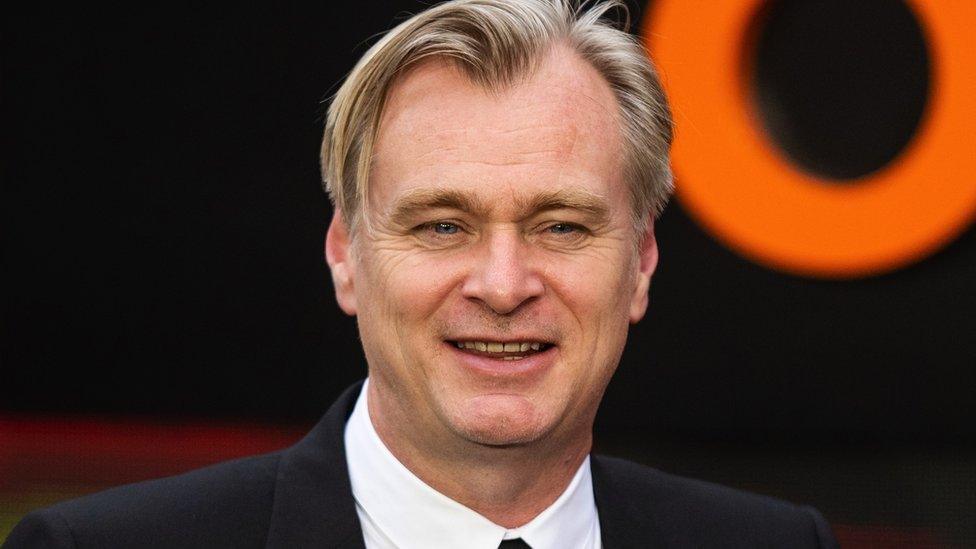
Christopher Nolan says the strike is about "jobbing actors, staff writers trying to raise a family, trying to keep food on the table"
Oppenheimer director Christopher Nolan has said he "absolutely" will not work on another film until the Hollywood strikes are resolved.
Tens of thousands of Hollywood actors have joined writers in taking industrial action, because they want streaming giants to agree to a fairer split of profits and better working conditions.
The Screen Actors Guild also wants to protect actors from being usurped by digital replicas.
Nolan admitted he was "very fortunate with the timing", as his film's premieres were held just before the strike began, meaning Oppenheimer would not be affected by industry members stopping work.
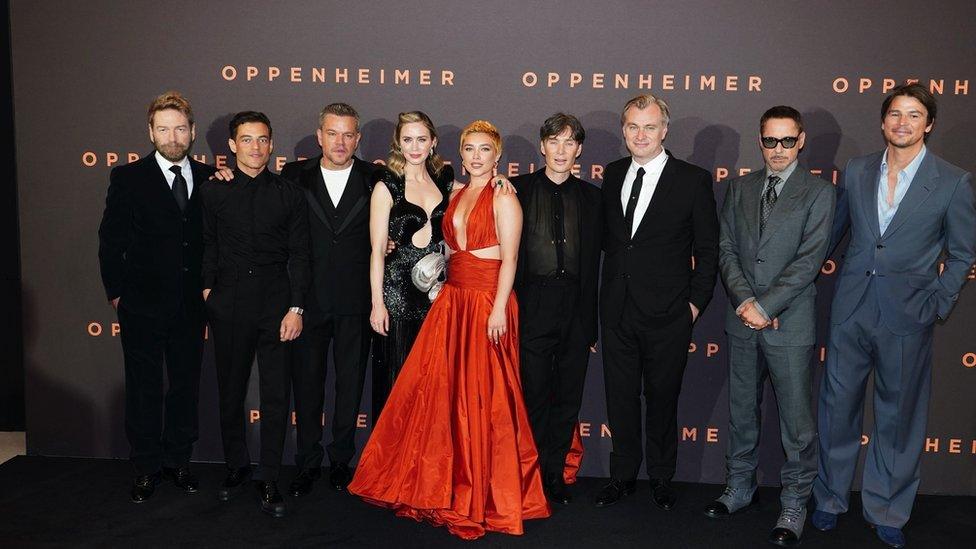
Christopher Nolan (third from right) with the stars of Oppenheimer at the film's premiere in London
When asked if he would write another film during the strike, he told BBC Culture editor Katie Razzall: "No, absolutely. It's very important that everybody understands it is a very key moment in the relationship between working people and Hollywood.
"This is not about me, this is not about the stars of my film," the acclaimed director, writer and producer added.
"This is about jobbing actors, this is about staff writers on television programmes trying to raise a family, trying to keep food on the table."

Oppenheimer stars Peaky Blinders' Cillian Murphy, who has already appeared in five Christopher Nolan films
As more production companies use streaming platforms - like Netflix and Amazon Prime - for their shows, it has changed how actors and writers get paid.
Previously every time an episode was re-run on a TV network, it would tend to involve payment, allowing those who worked on projects to get by in between jobs.
The director said the companies involved had not yet "accommodated how they're going to in this new world of streaming, and a world where they're not licensing their products out to other broadcasters - they're keeping them for themselves".
Nolan, who was Oscar-nominated five times, external for the films Dunkirk, Inception and Memento, added: "They have not yet offered to pay appropriately to the unions' working members, and it's very important that they do so.
"I think you'd never want a strike, you never want industrial action.
"But there are times where it's necessary. This is one of those times."
Speaking ahead of the London premiere, where several of Oppenheimer's stars left the red carpet early to strike, he explained: "It's very important to bear in mind that there are people who have been out of work for months now, as part of the writers strike, and with the actors potentially joining - a lot of people are going to suffer."
Watch: How the Hollywood strike affects you in 75 seconds
Despite the row in California, British-born Nolan has no current plans to work more in the UK, his home country, as he prefers to be "on the real locations" where his films are set.
"The UK has wonderful film studios," he explained. "It's a great place to come to shoot a film if you're going to be on sound stages."
Oppenheimer tells the story of J Robert Oppenheimer, the enigmatic Manhattan Project scientist, who had a leading role in developing the atomic bomb that made him a "destroyer of worlds".
He "gave us the power to destroy ourselves and that had never happened before", Nolan said.
Commissioned by the US Government during World War II, and believing themselves in a nuclear race with the Nazis over who would create the bomb first, in 1945 scientists in Los Alamos, New Mexico detonated a test bomb, codenamed Trinity.
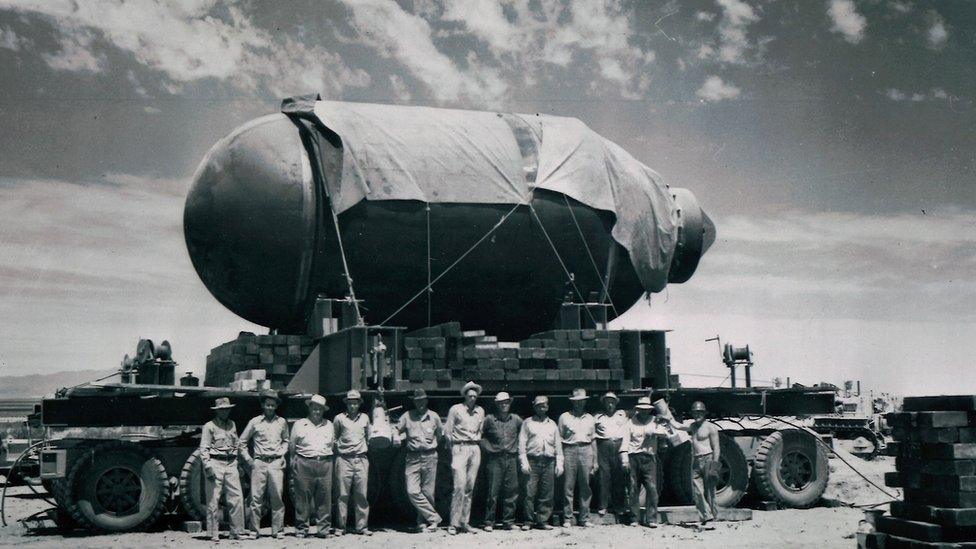
Nicknamed 'Jumbo', this huge vessel was designed to act as a failsafe device for the Trinity Test explosion, but wasn't needed
Their invention was then used, controversially, to end the war, dropped on Hiroshima and Nagasaki to devastating effect.
The film is an exploration not just of Oppenheimer's story, but of the "incredible decision" the scientists took on that first occasion.
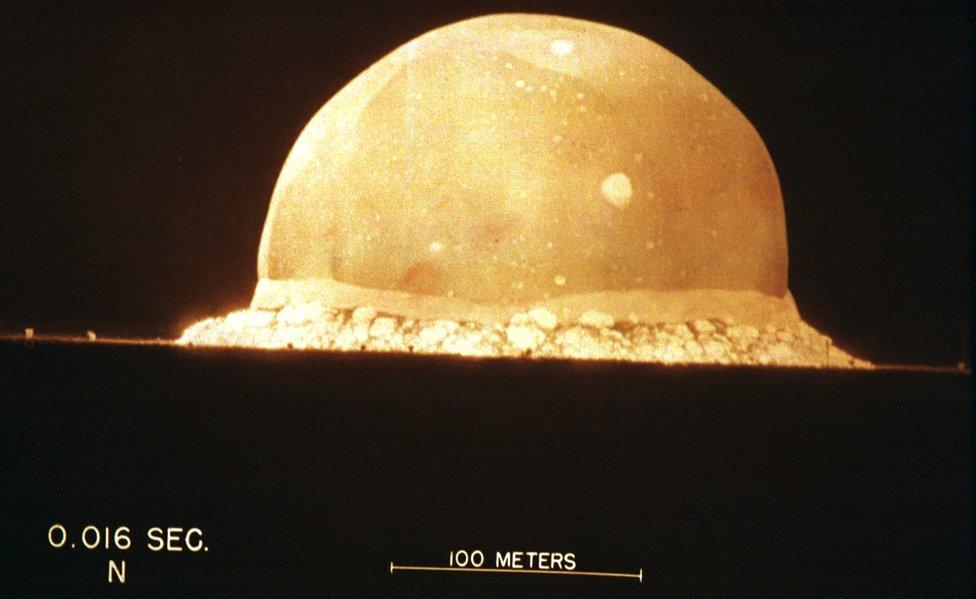
Trinity was the codename of the world's first nuclear weapon, which was successfully detonated in the New Mexico desert in 1945, as part of the Manhatten Project
"There's a possibility that when you push that button, you might destroy the entire world," Nolan told the BBC.
"And yet they went ahead and they pushed it. How could you make that decision? How could you take that on yourself?"
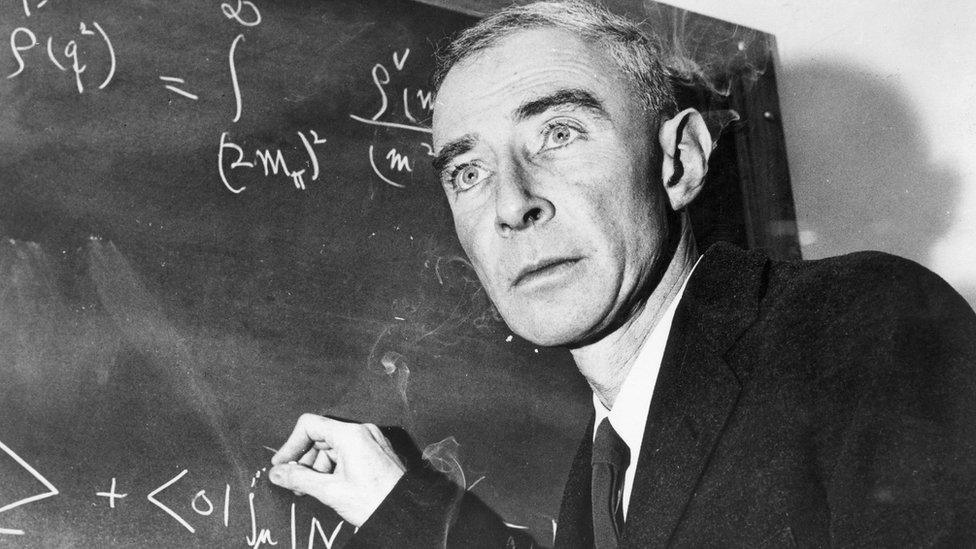
J Robert Oppenheimer was a US theoretical physicist
Another existential threat to civilization is AI, which is also part of the Hollywood strike and makes the Oppenheimer movie more timely.
"One of the interesting things about putting this film out is it's coming at a time when there are a lot of new technologies that people start to worry about the unintended consequences," he said.
"When you talk to leaders in the field of AI, as I do from time to time, they see this moment right now as their Oppenheimer moment. They're looking to his story to say, 'what are our responsibilities? How can we deal with the potential unintended consequences?' Sadly, for them, there are no easy answers."
Nolan is one of a rare number of Hollywood directors. His films - Interstellar, the Dark Knight Trilogy, Inception amongst them - are both blockbusters and arthouse fare; critically acclaimed and, Tenet aside, which was released during the pandemic, box office successes.
"I make the films that I really want to go to the cinema and sit down with my popcorn and watch" he says. "I started making films when I was a kid. I made Super 8 films from when I was seven or eight years old and I've never stopped".
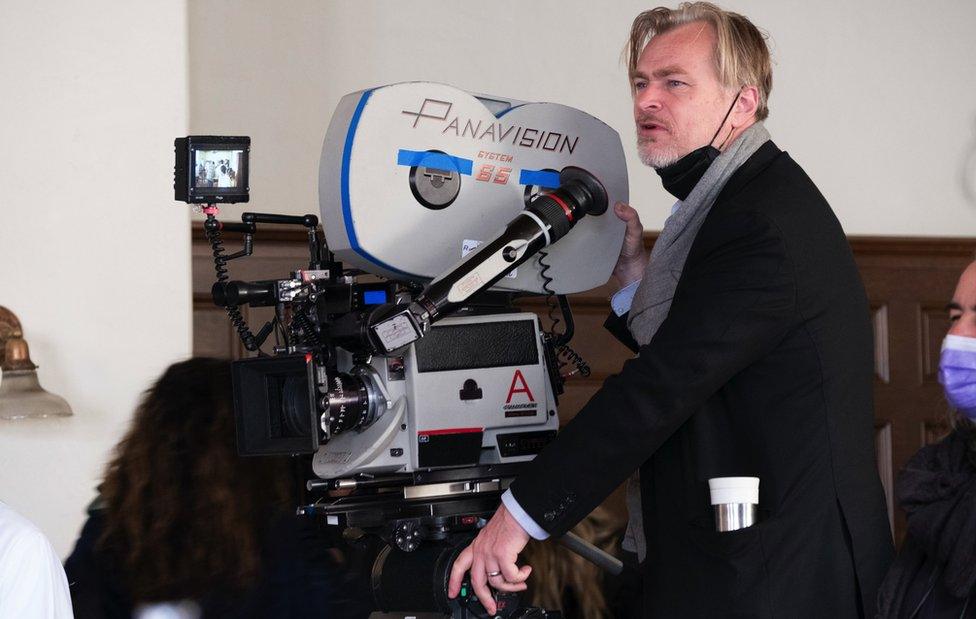
Christopher Nolan on the set of Oppenheimer, was hailed as 'a genius' by Cillian Murphy
He's a champion of the big screen who, famously, left Warner Bros for rival Universal to make Oppenheimer.
Nolan's known for wanting his films to feel authentic rather than computer-generated.
There was even a rumour doing the rounds on the internet that he had set off a real atomic bomb in New Mexico for Oppenheimer.
"We recreated the circumstances of it," he said, "obviously not using an atomic weapon. What we're trying to portray is this moment of absolute beauty and absolute terror.
"This is the moment that really changed the world."
The full interview with Christopher Nolan can be seen on the BBC iPlayer for the next 11 months.
Related topics
- Published14 July 2023
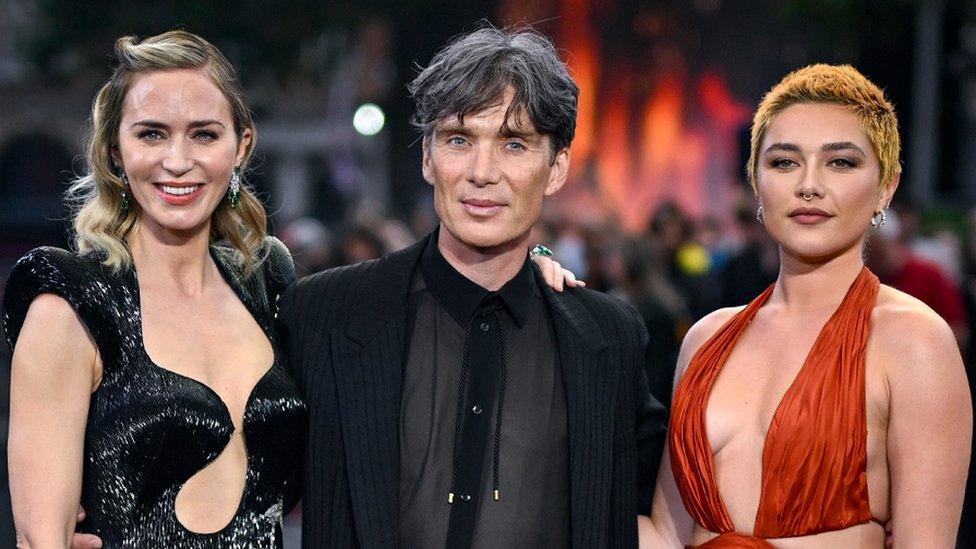
- Published14 July 2023

- Published13 July 2023
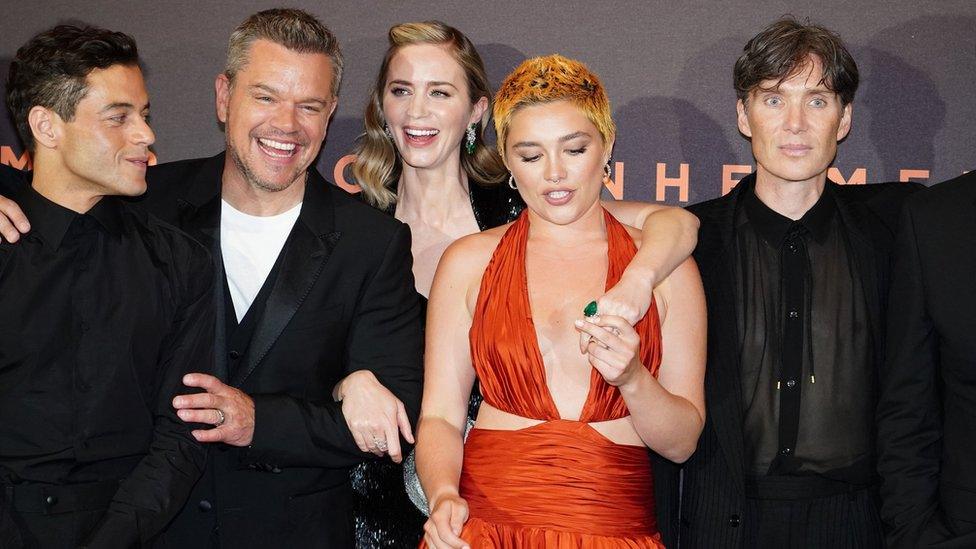
- Published8 December 2020
